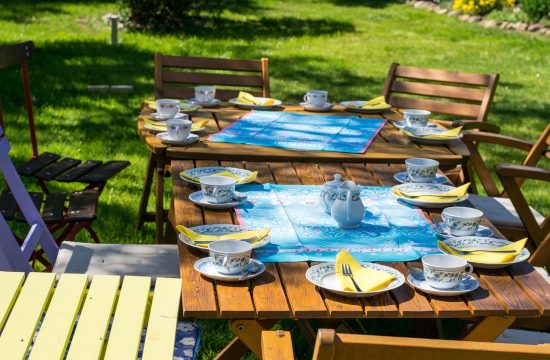BRADFORD, Vermont (STPNS) —
Over the last ten years, the U.S. furniture industry has
experienced a serious decline in manufacturing operations. According to the American Furniture Manufacturers Association, the U.S. was importing only 26% of its furniture in 1994, but by 2003, domestic imports had climbed to a stunning 51%.
Stiff competition from countries like China and emerging furniture industries in Brazil and Vietnam have forced the closure of a number of American manufacturing plants, particularly those in North Carolina and Virginia. Nationwide, furniture manufacturers are either rethinking their strategic plans or nervously waiting for the other shoe to drop.
Tim Copeland, owner of Copeland Furniture in Bradford, is not waiting. A maverick on the move, Copeland says he’s busy making a shift from small business operations to the streamlined processes of a larger business.
“For years, we operated on a tribal knowledge basis and it allowed us to achieve our goals,†Copeland said. “But we’ve reached a point where we need to make our exchange of knowledge more effective.â€Â Â
How did Copeland’s company reach this point? Â
He launched his Vermont manufacturing and retail business almost 30 years ago and staked his chance for success on self-taught carpenter skills and designs that emphasize the beauty of the wood grains.
“We occupy a niche that focuses on clean designs and natural hardwoods from the northern forests,†Copeland said. Today, he’s hitching his continued success on the company’s reputation for quality plus the introduction of an exclusive new line: the furniture designs of Frank Lloyd Wright, reproduced by Copeland Furniture.
When the Frank Lloyd Wright Foundation first approached Copeland, he was immediately intrigued. In fact, he thought his company was a perfect match for the Foundation’s expectations. He submitted a proposal to build a collection of licensed reproductions from Wright’s Prairie Period, 1900-1912, to be sold through high-end furniture stores around the country. Â
“The Foundation liked the proposal, and we signed a licensing agreement with them about a year ago,†Copeland said. “We are the exclusive, worldwide licensee, the only ones licensed to make the furniture designs of Frank Lloyd Wright. What that means is we can use Frank Lloyd Wright’s intellectual property assets and drawings and we can put his signature on the product.â€Â Â
Although the project is still under development, Copeland has already manufactured and shown the first 25 pieces at the International Home Furniture Center in High Point, NC, a town known by many as the “Furniture Capital of the World.â€Â Â
“We’re in the process of building and marketing what we think is the most exciting furniture brand opportunity in the industry in years,†said Copeland. Â
“We†is an employee crew of 100 working out of Copeland’s 70,000 sq. ft. factory on Bradford’s Lower Plain. Eighty-five of them do hands-on carpentry and woodwork, and the other 15 are distributed throughout administrative, marketing and sales offices. The working area is spacious but it wasn’t always this way.
Copeland’s roots travel back to his parents’ one-room garage where he built wood-framed cider presses for a company called Gardenway. After a time, he hired one, then two helpers and within a year he was employing five or six assistants. When the company grew to 10 employees, he rented a larger space in what had been a trucking garage for an old bobbin mill in the village of East Corinth.
“We did it on a shoestring,†Copeland smiled. “I had some basic tools and several thousand dollars worth of supplier credit, and we would make the product and deliver it and stand there asking to be paid. So we really did bootstrap it from the beginning with no outside financing.â€
Copeland left East Corinth in 1979, built a small building in the Bradford Industrial Park and moved his operations there. He later purchased an 18,000 sq. ft. building and expanded yet again. The building was all wood-framed with no sprinkler system, and on a windy night in November of 1984, the building caught fire and burned to the ground. Â
Copeland didn’t hesitate. “We rented facilities in Groton and bought some equipment and we were back in business by February,†he recalled. It was then that he decided to build the existing structure, which he financed with an industrial revenue bond and a $600,000 bank loan backed by the U.S. Small Business Administration. Â
Asked if he could offer advice to anyone wanting to start their own business, Copeland said, “Just be stubborn and brave and persistent. Don’t give up. Once you head off in a direction, don’t look back.â€
It’s a philosophy that seems to have paid off in more than mere income for Copeland. He says his profits have increased over the years by at least ten fold, but what he most enjoys is a sense of accomplishment, which he says is still a work in progress. His main interest at the moment is developing the Frank Lloyd Wright furniture.
“We think the combination of building our own brand and being in the right place at the right time with the Frank Lloyd Wright brand puts us in a situation where we have a phenomenal opportunity to grow,†Copeland asserted with a grin.
Action-oriented and forward-looking, Copeland’s strategies for success simply don’t include failure. If the other shoe should drop, he’s likely to try it on.
EDITOR’S NOTE: Kate Herrington is the public information officer for the Vermont District Office of the U.S. Small Business Administration.
© 2014 Journal Opinion Bradford, Vermont. All Rights Reserved. This content, including derivations, may not be stored or distributed in any manner, disseminated, published, broadcast, rewritten or reproduced without express, written consent from STPNS.










